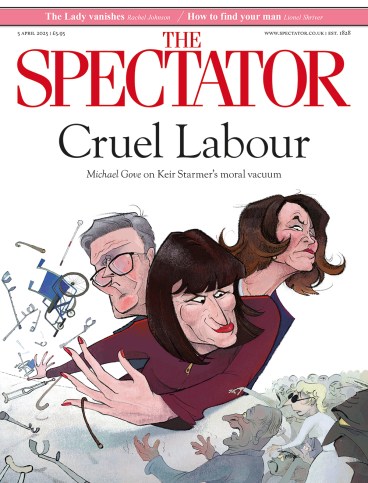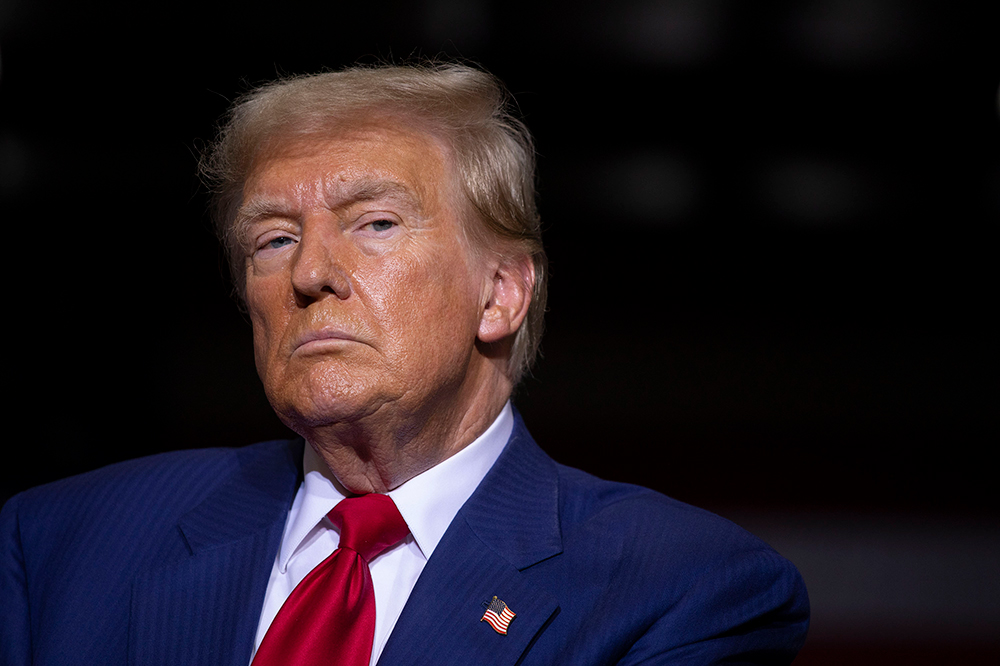
It seems the US State Department sees an impediment to free speech as an impediment to free trade with Britain. It cites the recent incident in which a woman, Livia Tossici-Bolt, was arrested for holding up a sign as she prayed alone and silently near a Bournemouth abortion clinic. It says it is ‘monitoring’ the case. Many here will dismiss this intrusion as a typically loopy product of the Trump era. In a sense, it is. It is also a spurious justification for American tariffs which are happening anyway. But it should teach us something about how others see us. It is commonplace for British governments of both parties to object to the policies of other countries, notably in the Middle East and Africa, in relation to LGBT+ rights. Our politicians let these objections affect other subjects, such as sporting or commercial links. This causes offence in those countries as being both contrary to their moral code and none of our business. Trumpery is giving us a taste of our own medicine. It seems obvious to virtually all Labour MPs and some Tory ones that abortion is a social benefit, and so, ignoring free speech issues, they penalise public prayer against it. But it is not obvious to everyone, everywhere. Hundreds of millions of people, including perhaps a third of Americans (and even significant numbers here), think abortion is wrong. We arrest one woman for silent prayer but allow many thousands of Hamas sympathisers to march repeatedly, shouting their hatred of Jews in the streets on London. Are we any less weird in our way than the Trumpians are in theirs?
Could the sentencing of Marine Le Pen have happened here? Eligibility to be head of state does not arise for a monarchy in the same way that it does in a republic. But what about eligibility for other office? It used to be that any British citizen could be elected to the Commons, though it did not automatically follow that he could take his seat, which was a matter for parliament itself. In April 1981, Bobby Sands, an IRA terrorist on hunger strike in prison, was duly elected to parliament in the Fermanagh and South Tyrone by-election of April 1981. Sands never sat, firstly because Irish Republicans are abstentionists, secondly because he was in jail, and finally because a month later he was dead. To prevent another hunger striker standing, an emergency law forbade the election of convicted felons, but this failed in propaganda terms because a Republican still won the by-election caused by Sands’s death. The new law was a bad idea anyway. Voters should be free to elect any adult citizen, however controversial, who has the necessary nomination papers. Parliament can then debate the issues raised. On similar principles, John Wilkes, friend of liberty, was repeatedly re-elected to parliament by the voters of Middlesex in 1769 though he had been imprisoned, outlawed and expelled. In 1961, the voters of Bristol South East re-elected Anthony Wedgwood Benn (later democratised as Tony Benn) even though he could not take his seat because he had just inherited his father’s place in the House of Lords. Benn won a change in the law and was re-elected in a second by-election in 1963. Here and abroad, the left should stop trying to run politics through the courts – not least because it makes them much likelier to lose at the ballot box in the end.
In the Lords, we have just finished the fifth and final committee day of the Hereditary Peers Bill, which abolishes the 92 (currently, I think, 87) ‘excepted’ hereditaries who remained after the Blair purge. As well as the constitutional issues, this is an uncomfortable human story. Unlike the Commons, the Lords prides itself on good fellowship across parties, so the thought that they are about to kick out people they have worked with, in some cases for 50 years, hurts. It feels personal, a ‘soft power’ version of those Acts of Attainder which Tudor monarchs forced upon their parliaments to destroy noble dynasties they considered over-mighty. My particular sympathy goes to the four Labour hereditary peers, who cannot express their inner thoughts. The most poignant and prominent is Viscount (Stephen) Stansgate, elder son of Tony Benn (see above). Whereas Tony stood in by-elections to leave the Lords, Stephen stood in one to get into it, although in his case the electorate (fellow Labour hereditaries) was, I think, three. He was elected unopposed and is an outstanding member of the House. Even many who (unlike me) want to get rid of the hereditary principle dislike this senseless slaughter of good men. On Tuesday, a cross-party amendment was moved which would have allowed all the ‘92’ to be made life peers on abolition, thus bringing in the reform without hurting its individual victims. Labour sullenly faced it down. I feel the third Viscount Stansgate should be our mascot. We back Big Benn!
In the nearly 25 years I have owned a flat in London, I have continued to receive letters addressed to a former occupant, Miss M. Nakahara. Actually, I think she is a pretend former occupant, since I knew the previous owner, who had no lodgers and did not bear that name. I could not trace Miss Nakahara. After a few years, I opened one of her letters to see why they kept coming. It was about her savings account at Lloyds bank. I wrote to Lloyds to ask them to stop, but they continued. This week, the latest Lloyds letter arrived for her. I wonder how many thousands of untraceable or nonexistent people are being chased pointlessly down the decades, and why the banks don’t mind all that postage.
The RSPCA wants dog licences brought back. It is right that a great many dog owners are unsuitable and unchecked. But more than a third of households own a dog in Britain, and we all think the bad owners are someone else. Any party introducing a licence would lose the ensuing general election, so there is no point in raising the matter.







Comments